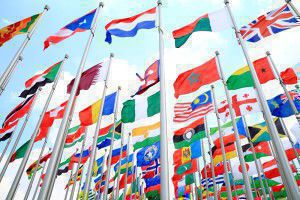10 cool words that don’t exist in English [Infographic]
A while back, we discovered this infographic of words that don’t have a direct translation in English. We loved it so much that we decided to see if there were any more words like these and create our own. So here it is – 10 cool words that don’t exist in English. Please do share any other suggestions as we’re sure there are many, many more…
As always, you’re welcome to share this post with friends, or embed the infographic on your own website, if you’d like to.
Infographic created by Alex, who did all the research, and Luke, our fab graphic designer 🙂
Embed This Image On Your Site (copy code below):
Does speaking another language make you sexy?
The other day I discovered this article online. I already knew that Bradley Cooper spoke French, but was pretty happy when I realised that I could also listen to Johnny Depp, Ben Affleck and Colin Firth speaking various other languages too (French, Spanish and Italian, respectively). Being Grazia, the article is aimed at a female audience and only features male actors, but there are many famous women who also speak languages – Mila Kunis (Russian), Gwyneth Paltrow (Spanish), Natalie Portman (Hebrew) and Shakira (everything), among many others.
Here’s Bradley in action. I don’t speak French, unfortunately, so I have no idea what he’s saying, but it certainly sounds pretty good.
It’s easy to assume that movie and pop stars only speak English, because we only ever see them speak that language at the cinema or on TV. And let’s be honest, who hasn’t assumed at some point that because they’re rich and beautiful, they’re also lazy and probably not prepared to make the effort? As a result, we tend to be very surprised and make a big deal of it when we realise they do speak another language – even though, just like the rest of us, they went to school, go on holiday, have in-laws from another country to impress and sometimes may even need another language for work. So why is it so surprising?
Now – go to YouTube, search for ‘Bradley Cooper French’ and read some of the captions. Many of them say something along the lines of, ‘As if he couldn’t get any hotter…’ or ‘Bradley Cooper just keeps getting sexier!’ Which made me think – does speaking another language really make us sexy? And if so, surely this would be the perfect argument to encourage young people to keep going with languages at school? Never mind that they can get a better job, earn more, travel the world – if we could tell them it’ll make them more attractive to that girl/boy they fancy, maybe they’d be more interested.
 But of course not all men are Bradley Cooper or Johnny Depp (more’s the pity). So I have to wonder – is it the language that’s sexy, or the person speaking it? If Bradley Cooper were just Bradley from next door, would we be so impressed? I’m not sure that we would.
But of course not all men are Bradley Cooper or Johnny Depp (more’s the pity). So I have to wonder – is it the language that’s sexy, or the person speaking it? If Bradley Cooper were just Bradley from next door, would we be so impressed? I’m not sure that we would.
And also, why doesn’t this apply to all languages? If my experience of watching The Big Bang Theory is anything to go by, guys speaking Klingon tend not to have the same effect on women (for the most part – I know to some ladies it’s very attractive).
I’d love to hear what you think about this. Do you like someone more if they speak another language? Or is it just a nice bonus, which only applies to someone you already fancy? And will you be learning some French to impress your partner this Valentine’s Day? Let us know in the comments below 🙂
Liz
Languages for the future: the top ten
A recent report by the British Council has laid out the ten most important languages for the UK’s future, in political, economic, educational and cultural terms.
According to the report, the ten most important languages, in order, are: Spanish, Arabic, French, Mandarin, German, Portuguese, Italian, Russian, Turkish and Japanese. I read this list with a certain amount of smugness that I speak Spanish, German and French – although my knowledge of key languages such as Mandarin and Arabic is, sadly, next to nothing. So feel free to give yourself a pat on the back if you can speak, or are learning, one of those ten languages.
 Unfortunately, the report also indicated that the numbers of UK residents actually learning these languages, especially the ones not taught in schools, are very low. On a positive note, around 15% of people can hold a conversation in French. However, only 6% are able to do so in German, 4% in Spanish and 2% in Italian. But the figures for the other languages are as low as 1%.
Unfortunately, the report also indicated that the numbers of UK residents actually learning these languages, especially the ones not taught in schools, are very low. On a positive note, around 15% of people can hold a conversation in French. However, only 6% are able to do so in German, 4% in Spanish and 2% in Italian. But the figures for the other languages are as low as 1%.
Perhaps one of the problems is that Mandarin, Japanese, Russian and Arabic all require learners to pick up another script. This might seem daunting, but is actually really exciting. Just being able to read simple words in another script gives you a huge sense of achievement, and you’d be surprised how quickly you can begin to decipher words from what previously looked like squiggles.
Hopefully if you’re reading our blog you already know the importance of language-learning, and that picking up a new language is an adventure rather than a chore! But maybe this list will give you an idea about which language you fancy picking up – maybe it’s time to start reviving your A-level French? Or be brave and give Arabic a try? Personally, I’m working on adding Italian to my list, which is proving interesting as I lapse back into Spanish as soon as I don’t know a word!
The report recommends a much greater focus on languages in schools and that businesses should invest in language training for languages that are useful in their industry. But don’t worry if your school days are behind you – it’s never too late to learn a new language!
Alex
What language is spoken in France?
A quick quiz question for you: what language is spoken in France?
Answer: well, French of course! But did you know France is also home to several small regional languages, including Alsatian, Catalan, Breton and Occitan?
 Like many other European countries, the French once spoke a wide range of regional languages and dialects. However, during the Third Republic, the French government made French the only official language, and outlawed use of regional languages such as Breton and Occitan in schools and institutions. The underlying idea of creating national and linguistic unity may have been well-intentioned, but as a result, most of these regional languages are now endangered.
Like many other European countries, the French once spoke a wide range of regional languages and dialects. However, during the Third Republic, the French government made French the only official language, and outlawed use of regional languages such as Breton and Occitan in schools and institutions. The underlying idea of creating national and linguistic unity may have been well-intentioned, but as a result, most of these regional languages are now endangered.
Nowadays, Occitan is spoken by around 1.33% of the population (in the Occitania region in Southern France), whilst Breton is spoken in Brittany by around 0.61% of the population. These languages are recognised by the government, but not considered official languages, and therefore given minimal support and opportunity for use.
The situation is a little more encouraging in Spain, where Basque, Catalan, Valencian and Galician are recognised as co-official regional languages, and a thriving community of native speakers exists in each of these regions.
This rather cool map shows how the areas over which each of these languages is/was spoken has changed over the last 1,000 years.
Over time, due to globalisation, mass media and government drives for national unity, the national languages in Spain, France and many other countries have established dominance and pushed smaller regional languages onto the sidelines. However, there are still communities of native speakers of each of these languages, and many people are passionate about passing on the language and culture of their region to the next generation.
Regional languages are often closely tied to the culture and identity of a region: the Catalonians I know are proud Catalan speakers, and often much of an area’s history, literature, music and so on is written in the regional language. These languages may be small, but they are certainly worth learning and preserving!
In fact, we have produced our Maths, age 3-5 and 4-6 apps in both Basque and Catalan, and uTalk is currently available in Galician, Basque and Catalan. And for anyone interested in regional French languages, why not learn a few phrases for free in Occitan, Breton, Alsatian or Provencal?
Alex
Where it’s at – how to say @ in different languages
The other day a colleague was telling someone his email address in French. He was halfway through and ran across a problem. He didn’t know the word for “the little ‘a’ in the circle”. In English we just say ‘at’, but that translates as ‘à’ in French and that sounds remarkably like the letter ‘a’. See the problem?
What he should have said was ‘arobase’, but different cultures call it completely different things – from official names to animal-based nicknames. Below we’ve found some of the most creative words for “the little ‘a’ in the circle”:
Animals (With Curly Bits)
The Germans, Romanians and South Africans (among others) all describe it as a ‘monkey tail’.
Thai and Hungarian people call it a ‘worm’ and the Italians refer to it as a ‘snail’.
The Swedish and Danish describe the shape as an ‘elephant’s trunk’ and the Greeks think it looks more like a ‘duckling’.
Curly Food
In Catalan, the “little ‘a’ in the circle” is named after a swirly pastry called an ‘ensaïmada’.
In Hebrew it’s named after a strudel.
In Slovak, it’s named after a rolled pickled herring!
Other Uses
The “little a” isn’t only used in email addresses. In Spanish, the symbol is sometimes used to represent masculine and feminine gender in the same word, for example ‘amig@s’ means male and female friends, although this is frowned upon by the Real Academia Española, so we don’t recommend it!
And in Portugal and Brazil, the symbol is used in text messages to represent ‘french kiss’ – so be careful how you use it if you’re travelling in those countries…
What do you call the @ symbol?



